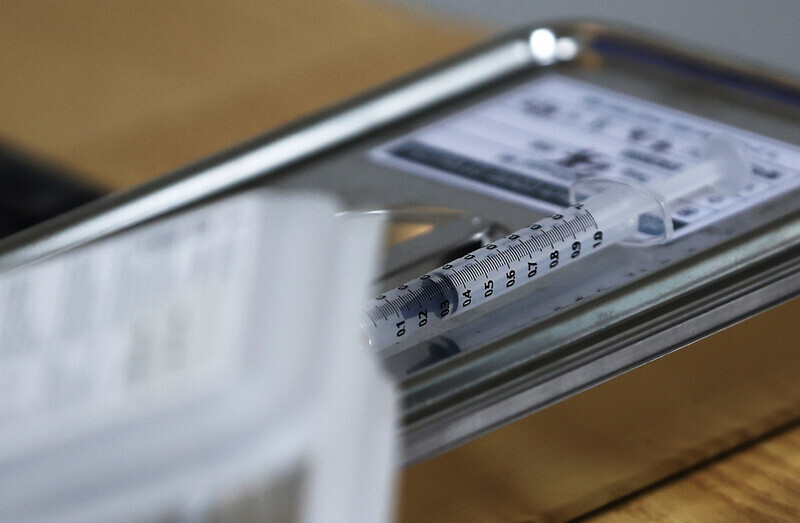hankyoreh
Links to other country sites 다른 나라 사이트 링크
S. Korea to face COVID-19 vaccine shortage until new shipment arrives in late May

South Korea’s current reserves of the COVID-19 vaccine produced by AstraZeneca (AZ) amount to less than 200,000 doses.
The discovery comes when the administration of first doses of another vaccine by Pfizer is being delayed in certain parts of South Korea due to supply imbalances. This means that early to mid-May will mark a “dry spell” for AZ vaccine administration until the additional 3,668,000 doses scheduled to arrive this month make their way to vaccination sites.
Based on this schedule, administration of the vaccine to nearly 5 million South Koreans aged 65 to 74 will have to wait until the end of the month to begin.
The South Korean COVID-19 preventive vaccination response team announced Sunday that 1,829,239 people had received their first dose of the AZ vaccine as of the start of that day. With a gap of 10 to 12 weeks between administration of the first and second doses, vaccinations with the second dose of the vaccine have not yet begun.
To date, 2,006,000 doses of the AZ vaccine have arrived in South Korea. This means that 91.2% of total received volumes have already been administered.
Based on simple subtraction, the remaining amount of the AZ vaccine was determined to amount to 177,000 doses. Even if the use of low dead space (LDS) syringes allows for a 10-20% increase in the number of people receiving vaccinations from a single vial, this still leaves fewer than 200,000 remaining doses available.
Fortunately, authorities appear likely to finish administering first doses to the scheduled vaccination recipients for February to April — namely those in long-term care hospitals and senior care facilities, medical institution staff, employees and residents of facilities deemed vulnerable to infection, and first responders.
Among those scheduled recipients, around 170,000 have agreed to or reserved vaccinations but have not yet received them.
The key question, for now, is whether the next AZ vaccines will arrive before the administration of second doses is scheduled to begin on May 14 for the recipients who received their first doses the earliest. A large number of vaccines will be needed to administer their second doses while also providing first doses to others aged 65 to 74.
The South Korean government has explained that 1,668,000 doses are to arrive in May through the COVAX Facility, while another 2 million doses are to be shipped according to a separate contract. No concrete timeline has been given for the arrival.
The government previously said it was considering excluding those under 30 from receiving the AZ vaccine and administering the corresponding doses — enough for 640,000 people — to others aged 60 to 64. That schedule has not been specified either.
In a regular briefing on March 29, Jung Eun-kyeong, who heads the vaccination response team, said the “supply schedule has been roughly set at 2 million doses by the end of May for the AZ vaccine acquired through a separate contract, with another 5 million doses arriving in late June.”
On March 19, she said that “preparations are underway with commissioned health care institutions so that they can begin inoculations for people 65 and over in late May.”
In the case of the Pfizer vaccine, a total of 2,117,000 doses had arrived as of Sunday, with 1,801,867 of them used for the administration of first and second doses. Some of the 1.75 million doses scheduled for shipment in May are set to arrive sometime around Wednesday.
The vaccination response team said Sunday that it would “issue an announcement [Monday] regarding the actual remaining volumes of AstraZeneca and Pfizer vaccines, the supply plan, and the revised vaccination plan for the second quarter.”
By Choi Ha-yan, staff reporter
Please direct comments or questions to [english@hani.co.kr]

Editorial・opinion
![[Column] Life on our Trisolaris [Column] Life on our Trisolaris](https://flexible.img.hani.co.kr/flexible/normal/500/300/imgdb/original/2024/0505/4817148682278544.jpg) [Column] Life on our Trisolaris
[Column] Life on our Trisolaris![[Editorial] Penalties for airing allegations against Korea’s first lady endanger free press [Editorial] Penalties for airing allegations against Korea’s first lady endanger free press](https://flexible.img.hani.co.kr/flexible/normal/500/300/imgdb/original/2024/0502/1817146398095106.jpg) [Editorial] Penalties for airing allegations against Korea’s first lady endanger free press
[Editorial] Penalties for airing allegations against Korea’s first lady endanger free press- [Editorial] Yoon must halt procurement of SM-3 interceptor missiles
- [Guest essay] Maybe Korea’s rapid population decline is an opportunity, not a crisis
- [Column] Can Yoon steer diplomacy with Russia, China back on track?
- [Column] Season 2 of special prosecutor probe may be coming to Korea soon
- [Column] Park Geun-hye déjà vu in Yoon Suk-yeol
- [Editorial] New weight of N. Korea’s nuclear threats makes dialogue all the more urgent
- [Guest essay] The real reason Korea’s new right wants to dub Rhee a founding father
- [Column] ‘Choson’: Is it time we start referring to N. Korea in its own terms?
Most viewed articles
- 1New sex-ed guidelines forbid teaching about homosexuality
- 2OECD upgrades Korea’s growth forecast from 2.2% to 2.6%
- 3[Column] Life on our Trisolaris
- 4Months and months of overdue wages are pushing migrant workers in Korea into debt
- 560% of young Koreans see no need to have kids after marriage
- 6Korean government’s compromise plan for medical reform swiftly rejected by doctors
- 7[Guest essay] Maybe Korea’s rapid population decline is an opportunity, not a crisis
- 8S. Korea discusses participation in defense development with AUKUS alliance
- 9Presidential office warns of veto in response to opposition passing special counsel probe act
- 10Two lung cancer deaths at Samsung Electronics deemed occupational in nature